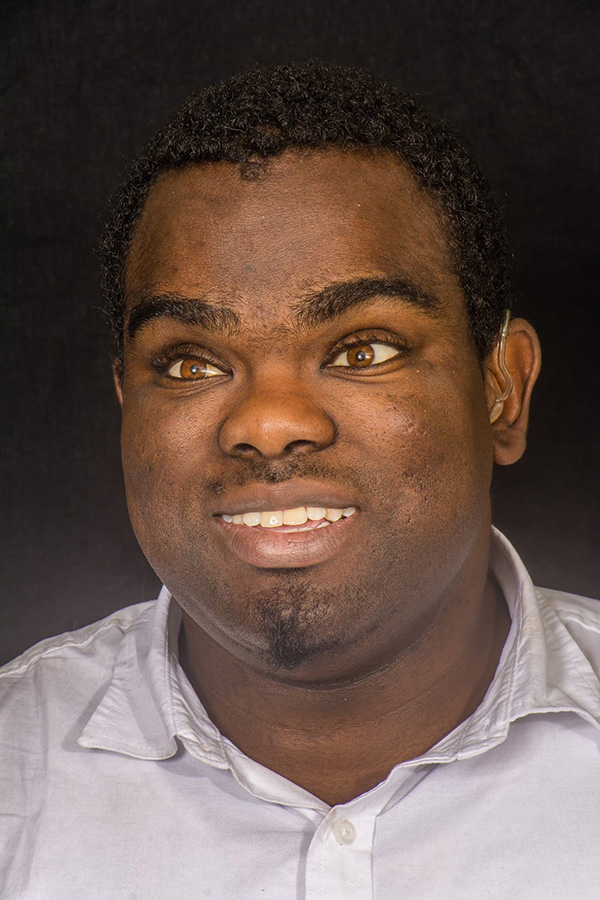By GCI by JNF

George Stern is a deafblind Afro-Caribbean immigrant interested in food, linguistics, and social justice. As a French major in college and someone more generally embedded in the Black and immigrant experience in the U.S., his interest is in the civic power of food and art. His focus is on food, foodways, and artistic endeavors and their ability to develop politically, financially, emotionally, and environmentally resilient communities. One of his dreams is to be the owner-chef of a farm-to-table restaurant that doubles as a community space and a venue for civic discussions.
When and where did your culinary journey begin?
My culinary journey began as a nine-or-ten-month-old, counting out fresh eggs on a kitchen island with my mum while Dad prepared for work. Or maybe it started with me sitting on the bottom rung of a ladder, leaned up against our coconut tree, impatient for the next wobbly spoonful of “jelly” from the cutlass-split shell. Or, no: it must’ve begun the first time I caught an aroma in the air and categorized it instantly, appreciatively; fried snapper. My culinary journey continued because, even after I went blind at age two, my parents maintained the kitchen as a place of wonder, experimentation, laughter, and tangible, edible love, not just for me but for my younger sisters. We all remember the thrill of getting our own pieces of dough to roll when an adult set to making dumplings and the chewy crunch of freshly browned oxtail before the pieces went for a gravy bath.
Why did you apply to the Galilee Culinary Institute by JNF Flagship program, and what do you hope to gain from it?
I applied to the GCI flagship program because Lior Lev Sercarz kept inviting me to do so during every intermission of the “ What’s Burning” podcast—in all seriousness, listening to What’s Burning led me to apply. Mitchell and his guests were overthinking food just as I do; they were discussing the wide-ranging, inter-disciplinary questions that others couldn’t connect to “food” when I posed them. But, most of all, they displayed a committed irreverence towards “the way things have always been done” that made me think maybe the culinary-verse had room for a deafblind, communally-minded, insatiably curious person like me after all. I hope to get a non-Eurocentric education in culinary fundamentals that will help me tell all the food stories in my head – stories of diaspora, community resilience, symbiosis, and origins – effectively and deliciously. A chance, too, to make culinary spaces more inclusive of disabled folks like me, from range to dining table to website. Lastly, I want to see how like-minded people open a culinary school because I’d like to open one myself (when I’m grown up).
GCI by JNF's vision is about building bridges through food; how do you relate to that vision?
I relate to it very well, as it’s a vision I’ve lived by for some time now. That said, I also know its limitations. On the one hand, my first foray into culinary writing was a call for increased focus on accessible, inclusive design and content among cooking websites. Why? Because I believe that disabled people, in particular, can benefit from food’s power to comfort, humanize, express and affirm love, celebrate and replicate culture – in essence, to be a bridge from the isolation and marginalization of “inconvenient identities,” to the community, belonging, and the sense of worth that comes from these things. But, well, bridges only offer the potential for connection; it’s still up to us human beings to bring that connection to bustling, reciprocal life. No matter how delicious, food will not dissolve the walls of fear and disgust that keep disabled people (and others) on the margins of society. Nor, sadly, can we expect cuisines to overcome our diligently entrenched hatreds through flavor and sauce. That’s work we all have to do ourselves, hard choice by hard choice.
How do you relate to the GCI vision and what they are trying to do with culinary?
I once told a classful of perplexed freshmen and sophomores that food was, for me, the most accessible and approachable art form. However, you wouldn’t know it from our Instagram era’s emphasis on its visual dimension. Yet, food is the one medium that all our senses appreciate: touch, smell, sight, hearing, taste, and language (yes, I’m calling it, language is a sense!). GCI’s “Discover, Engage, Create” approach to culinary education is, therefore, one that makes intuitive sense to me. Indeed, it gives me hope, for the prevailing paradigm - which seems to amount to “Look, mimick, present” – has consistently not found any room at its polished table for this disabled culinarian. And as someone whose daily existence depends on the flexibility of mind, attitude, and even nervous system, I’m heartened by the exuberant celebration of flexibility as a modus operandi for GCI’s flagship program.
What's a fun culinary fact about you?
Growing up in a Jamaican household, I only ever experienced rice as bought by the twenty-or-fifty-pound bag. You can just imagine my culture shock when, as a college freshman grocery shopping in Texas, I discovered that rice is also sold in single-serving packets, like Instant oatmeal, and equally microwave-ready. I’m still not over it, possibly because of a nagging sense of rice as a “we” food and not an “I” food.
To learn how you can support people with disabilities in Israel, visit jnf.org/disabilities. For more information about the Galilee Culinary Institute by JNF, visit galileeculinaryinstitute.com
This story first appeared in the Galilee Culinary Institute by JNF's Newsletter
